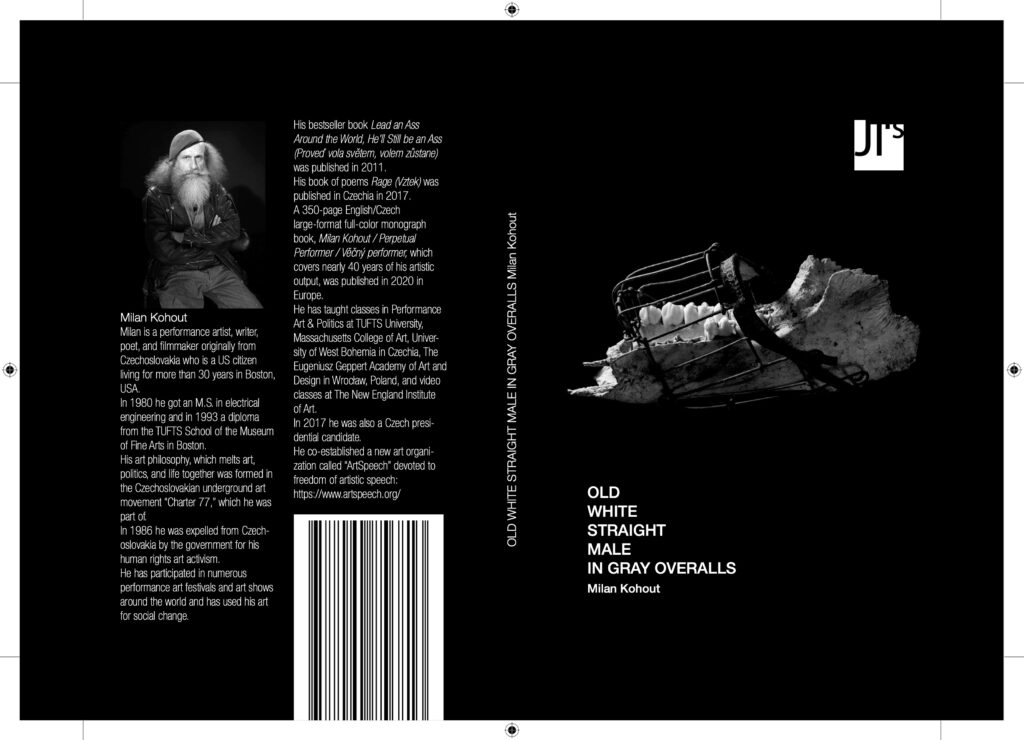
Review: https://blisty.cz/art/113737-the-art-of-being-sincere.html
The Art of Being Sincere
Review of Milan Kohout’s Old White Straight Male in Gray Overalls,
Krucemburk, JT’s Publishing, 2023
by Marie Kurfirt
A scholar at Harvard Davis Center in Boston
Milan Kohout’s collection of poems contains deeply personal observations of the contemporary world and glimpses into the feelings it evokes. This is his second poetry collection following Vztek (Rage) in 2017 also by JT’s Publishing.
The poet’s voice is clear, direct, and thought-provoking.
He states:
“Anger is good because it purifies stupidity
Again people call for wars in the name of the only one God.”i
“I wove my own scourge I bent down and started to whip my own naked back From time to time I glanced in the direction of the audience.”ii
The artist’s gaze draws the audience into active participation and reflection on self-punishment, guilt, masochism, and the self-flagellation’s religious undertones. Blunt, witty, and never superficial, the poet comments on established values and dares readers to question them. His rebellion against injustice and conformity is evident throughout the collection.
For example, he writes:
“It feels so good to embrace the oppressor
You are so * moved you are swallowed by joy
you smell the smell of power
you are so close to it
you feel you are chosen
you feel their soft hands petting you
You poor pet purr and do nothing.”iii
In a similar manner, the poet invites his readers to contemplate various themes, such as the human condition:
“chains on our human hands, cages around us !!!,”iv
social injustice:
“I was looking at the window of the bank office
my deaf friend helped me read the lips behind the glass:
Let’s divide and rule them,”
and fatherhood among others:
“The skies are getting gray
My daughter is sitting among many different looking kids on the merry-go-round
Black, White, Yellow, Brown, Tan
The circle is accelerating
The kids are laughing and screaming
Colors are blending
I am trying to locate my daughter
the circle is gray smudge I see all my daughters
Happy skies are getting grayer.”vi
Some poems take on media:
“Today I opened the New York Times
All pages were empty
Did somebody steal the letters?,”vii
others touch upon racism and social prejudice:
“My ex-wife wrote on a white T-shirt covering different skins:
“Asian lives matter”
I offered her a palette of colors,”viii “
Bostonians fighting for their right to decide about their gender
yell at the marching people being proud to be straight.
I lift my sign standing between two opposing groups.
Several transgender people wrest it from my hands and push me out of history.”ix
Composed in free verse, the poems captivate with their pristine clarity.
Resembling Zen koans, short enigmatic statements devised by Zen masters to help their students reach beyond conditioned thinking, they stir our minds and draw us into participation in the poet’s quest for truth and meaning.
A handful of the author’s metaphors may seem disturbing to a traditional mind, but one can easily identify with his voice as he points out the paradoxical nature of reality.
He belongs to the generation that lived under the communist regime in his native Czechoslovakia; an experience that shaped his rebellious spirit.
He was an active member of the Czech literary underground and a signatory of the Charta 77, human rights declaration against the communist government.
For this reason, he was expelled from his homeland and later granted political asylum in the United States. In Boston, Massachusetts, his home base for over thirty years, Milan Kohout was a member of the legendary artists’ group Mobius, and taught performance art at Tufts University, the Massachusetts College of Art, and the New England Institute of Art.
In 2016, Mr. Kohout ran as a candidate for the office of the president of the Czech Republic.
A memoir Lead an Ass Through the World, He’ll Still Be an Ass (Proveď vola svĕtem, volem zůstane), Prague, Edition PoP, 2011 is the author’s best-selling book to date.
Another publication, an impressive 350-page large format full-color monograph in Czech and English languages entitled Milan Kohout / Perpetual Performer (Milan Kohout / Vĕčný performer), which came out in 2020 in Prague at Petr Štengl’s Publishing, covers nearly forty years of his artistic output.
The poet’s critical stance is offset by good intentions, resilience, tenderness, and longing for justice.
His poetic sensitivity becomes apparent in lines such as:
“A tender red flower blooming in a crack in the asphalt in the street,”x
or:
“Another day I was crying standing in the deep woods because I saw young trees supporting a very old and aged tree which was losing its vertical independence in entropy of nature.”xi
As our world has been gradually becoming more and more complex, chaotic, and confusing, human voices of integrity and authenticity are very much needed.
Milan Kohout’s ability to convey experience through poetry and art is an inspiration to anyone who likes to question the status quo and ponder existential questions.
i Pg. 23 ii ppg. 45-46 iii ppg. 33-34 iv pg. 9 v pg. 19 vi ppg. 13-14 vii pg. 16 viii ppg. 19-20 ix ppg. 21-22 x pg. 51 xi pg. 43
Allen Razdow
“mixed media arts and technologies”
Northampton MA:
“Milan’s little gem of a book manages to avoid the transparent stridency of most political writing, to simply be poetry. Good poetry, from a heart focused on social justice. That he refused editorial “correction” of his non-native English allows him to write the language he lives in, and the work is better for it. What is any poetry if not un-native speech? For me, the test of poems is that I return to them. I’ve only had the book for a few weeks, and I do.“
